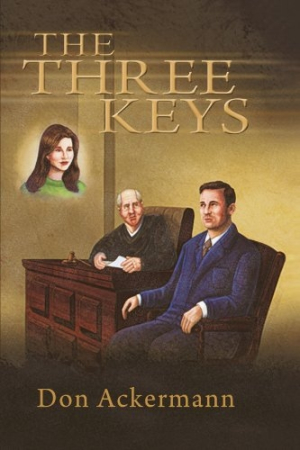The Three Keys
Precise storytelling, crisp and clear dialogue highlight this story of a middle-aged man caught in the consequences and complications of life.
The Three Keys by Don Ackermann is a novel exploring the value of family and scruples; is it right to sacrifice one to save the other? Ackermann shows readers a protagonist, James Schroeder, who is bogged down by his wife’s affair and an ugly court battle over a land dispute. Meanwhile, he faces his children’s choices as they move toward adulthood.
Schroeder is pinned between his desires to save his surveying business and to save his family—and it seems saving both isn’t an option. He is a principled man caught in bewildering trouble. This sets up the book for both external action and internal change—a powerful combination.
Ackermann’s storytelling is methodical and precise, driven by action rather than emotion. This tone fits well with Schroeder’s measured approach to life, but it also creates some sentences that feel a bit circuitous or burdened with adjectives, adverbs, and clauses: “As he rode, he would occasionally fill his lungs with big breaths of clean, sweet summer air, laden with all the scents of a living, thriving earth.”
Occasionally, as it departs from fact-driven narration, the writing ventures too closely to overwrought cliché: “The whole experience made him realize just how tightly he was wound, like the spring in the old pendulum clock that still hung on Pa’s living room wall.”
The dialogue is clear and crisp, and the character’s voice is realistic and distinct without distracting from the plot. The even pace of action and the rise and fall of the plot keep the book moving satisfyingly along, but the ending sets readers down a bit too gently and neatly after all the tension and upheaval: “‘I see. So now we know the end of the story. I’m glad it’s a happy one, son.’ With that, Ma gave Jim a smile borne of age and wisdom that only a mother could give her son.”
The cover image features Schroeder on the witness stand and his wife’s disembodied face hanging above the judge; this makes it seem like she’s dead and that perhaps the book is about a murder trial.
This novel will appeal most to readers who have faced the confusing, confidence-challenging trials of middle age and to anyone who has felt trapped amid the complications and consequences of life.
Reviewed by
Melissa Wuske
Disclosure: This article is not an endorsement, but a review. The publisher of this book provided free copies of the book and paid a small fee to have their book reviewed by a professional reviewer. Foreword Reviews and Clarion Reviews make no guarantee that the publisher will receive a positive review. Foreword Magazine, Inc. is disclosing this in accordance with the Federal Trade Commission’s 16 CFR, Part 255.

